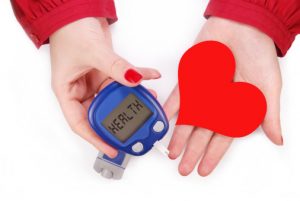 Having type 2 diabetes for many years can predispose you to an increased risk of heart disease. This is especially true in those with the metabolic disease who manage the condition poorly. Unfortunately, this is an all too common scenario, as those with type 2 diabetes are often unaware of their deteriorating heart condition because there may be signs or symptoms at all.
Having type 2 diabetes for many years can predispose you to an increased risk of heart disease. This is especially true in those with the metabolic disease who manage the condition poorly. Unfortunately, this is an all too common scenario, as those with type 2 diabetes are often unaware of their deteriorating heart condition because there may be signs or symptoms at all.
Type 2 diabetes and heart disease: A dangerous combination
Type 2 diabetes and heart disease comorbidity have been found to be more dangerous than previously believed. Study lead Dr. William White said, “Type 2 diabetes accompanied by an acute coronary syndrome needs much more attention, especially in order to prevent yet another major cardiac event.”
Advertisement
The study included over 5,300 people around the world with type 2 diabetes. Patients who were hospitalized for congestive heart failure had a 24 to 28 percent higher risk of death within an 18-month period. That’s five times greater than the risk in those who were not hospitalized for a heart-related problem.
Furthermore, heart disease risk is three times greater in those with type 2 diabetes compared to the general public.
The coexistence of heart disease and type 2 diabetes is mainly due to a common risk factor: obesity. High blood pressure and cholesterol also contribute to both conditions. Additionally, there are growing concerns that medications to control blood sugar may also have an impact on the heart over time.
The study, presented at the American Diabetes Association’s annual meeting in New Orleans, was also published online in the journal Diabetes Care.
Causes of diabetic heart disease
Over time, the blood vessels harden in those with diabetes, a condition called atherosclerosis. Most importantly, this occurs in the coronary blood vessels of the heart.
Hyperglycemia—increased blood sugar levels—is a characteristic of diabetes, and in combination with free fatty acids in the blood, it can start to change the contour of blood vessels leading them to become more and more occluded or blocked. This blockage is caused by a buildup of cholesterol plaques that make the lumen of the blood vessel rigid and inflexible. These plaques have the potential to break apart or rupture, leading the body to respond and try to repair the blood vessels. Because the blood vessel is already very narrow from the excess plaque accumulation, the process of blood vessel repair on a site of rupture can know take up more room than it normally would, leading to blockage of the blood vessel.
If this process occurs in the heart of the brain, a heart attack or stroke will most likely occur.
Diabetes and heart disease symptoms
It is important for those diagnosed with diabetes to have regular checkups with their family doctor, as many of the most devastating symptoms of the disease happen without the patient being aware of them. Recognizing early presenting symptoms and making efforts to help prevent them can effectively reduce or delay related problems. The following are diabetic heart-related conditions to be aware of:
Coronary heart disease: The most common symptom of this condition is chest pain or angina. It occurs because of the muscles of the heart not receiving enough oxygenated blood. Angina may feel like a pressure or squeeze in the chest. The pain may also travel to other parts of the body such as the shoulders, arms, neck, and jaw. Angina pain tends to get worse with activity and improves with rest in less severe forms. Other symptoms of coronary heart disease include nausea, fatigue, shortness of breath, sweating, light-headedness, and weakness
Heart failure: This condition occurs when the heart muscles become ineffective at pumping blood throughout the body. Common symptoms include shortness of breath, trouble breathing, fatigue, and swelling of the ankles, feet, legs, abdomen, and veins in the neck.
Advertisement
Diabetic cardiomyopathy: This condition may not present with symptoms initially, but later on, it may present weakness, shortness of breath, a severe cough, fatigue, and swelling of the legs and feet
Preventing heart disease in diabetic patient
Taking care of and properly managing your diabetes can give you the best chance to prevent heart disease as a result of your diabetes. The following should be maintained:
- Keep blood sugar in normal ranges
- Control blood pressure with a level below 130/80 being optimal for diabetics
- Control cholesterol levels
- Lose weight if obese
- Consider a daily aspirin at the recommendation of your doctor
- Exercise regularly
- Eat a healthy diet. Examples include the Mediterranean diet or DASH diet
- Quit smoking
- Reduce stress levels
By following these guidelines, you can give yourself the best chance of living a long and healthy life. Your doctor can help give you additional recommendations that may better fit your own personal situation.
